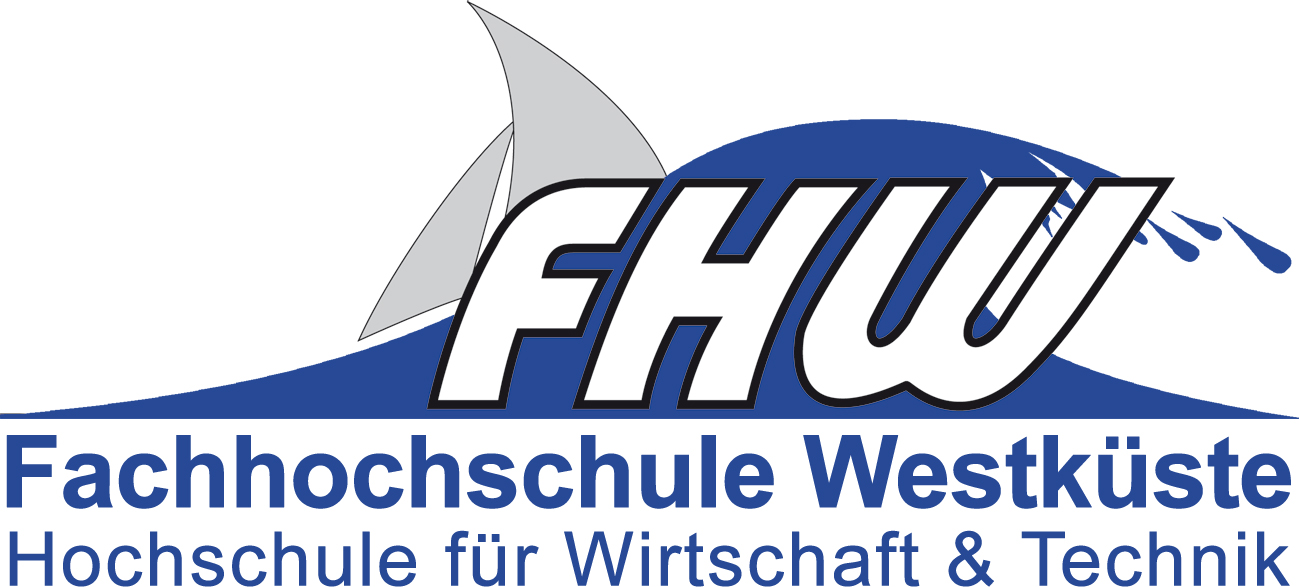|
Sat. Dec.
15 H01
10.00-13.15 h, 14.00-19.00
h
My tourism service provider for different
customer groups
+ Presentation Tourism in Pakistan
|
10.00-11.30 h
|
Intercultural Differences
as Opportunities in Tourism -
Entrepreneurship;
Hofstede; Example of Tourism in Japan
|
|
11.45-13.15 h
|
My international
tourism service provider
-
Group of max. 4 students
(if possible mixed: from source market and from host
destination) each develop ideas to start an internationally
orientated tourism service provider for a specific target
group
(for instance:
- Business Hotel in Hamburg for
Muslim visitors,
- inbound tour operator for European
visitors to community based tourism in South Asia,
-
Adventure
outbound tour operator for Russian customers traveling
to China
- Communication company for tourism
crisis management for international NTOs in Germany
etc.)
Think about:
-
Market niche - is there a demand? what about competitors?
what would make your company special?
- Specific demand
structure of target group
- How to match this demand
with the organisation, product, communication etc. of
your new company
- Tentative development plan for
the first five years of the new company
|
|
13.15-14.00 h
|
Lunch break
|
|
14.00-15.00 h
|
Presentation: Tourism
in Pakistan
|
|
15.00-16.30 h
|
Presentation and discussion
of results of group work:
New companies to conquer
the international market
|
|
17.00-19.00 h
St. Jürgen Church
Market Sq. Heide
Free entrance
|
INTERNATIONAL
CHRISTMAS SONGS AND CUSTOMS
Advents- u. Weihnachtskonzert der Heider Kantorei und des Heider
Posaunenchores
„Internationale Weihnacht”. Lieder zu Santa Lucia und aus aller Welt zum
weihnachtlichen Festkreis.
Chöre an St. Jürgen (Heider Kantorei,
Seniorenchor, Kinder- und Jugendchor, (Ltg.: Sebastian
Schwärze-Wunderlich)
Heider Posaunenchor (Ltg.: Gunda
Köster)
Weihnachtskonzert unter dem Motto
„Internationale Weihnacht”.
Die Chöre präsentieren adventliche und
weihnachtliche Lieder aus aller Welt. Dabei soll u. a. etwas von der
schwedischen Santa-Lucia-Tradition zu sehen und zu hören sein. An der
Fachhochschule Westküste wird der weltliche Teil dieser Tradition auf
Anregung von Anna Wölber, Schwedin und Dozentin an der FHW, gemeinsam
mit Sebastian Schwärze-Wunderlich und Studierenden schon seit einigen
Jahren begangen. Elemente der Santa-Lucia-Tradition, wie z. B. die
heilige Lucia mit dem Lichterkranz, werden auch in unserem Konzert
vorkommen. Ein vorweihnachtliches Lichterfest – lassen Sie sich
überraschen.
Der Eintritt ist frei. |
Entrepreneurship
and Tourism:
Why it is so easy to
start your own company in international Tourism
Hofstede's
Cultural Dimensions
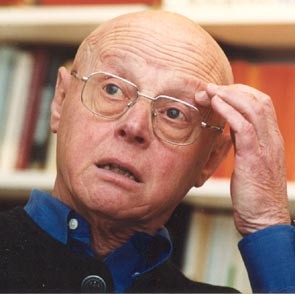
|
Geert Hofstede
Industrial age: »The big are eating the small«
Service age: »The fast are beating the slow«
Knowledge age: »Socially competent companies win against
socially incompetent companies«
|
Hofstede´s Five-Dimensions Model
Starting with IBM 1970s:
If all
engineers are working in the same company and having the same education
but still behave very differently, there must be cultural
differences.
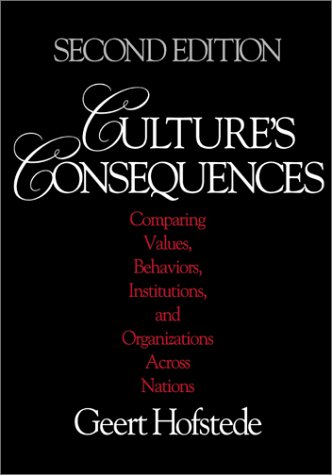
Culture, understood as the accumulation of shared meanings,
rituals, norms and traditions among members of an organisation or society, is
the collective programming of the mind which distinguishes members of one group
or society from those of another.
Therefore culture is not a phenomenon in its own right. It is
the difference perceived, and only then perceived, by one group when it comes
into contact with and observes another one. It is important to point out that the idea of pure cultures meeting in intercultural exchanges without much knowledge about the other culture is
outdated.
Today almost everybody
outside a given culture has some information and knowledge about that culture,
however superficial.
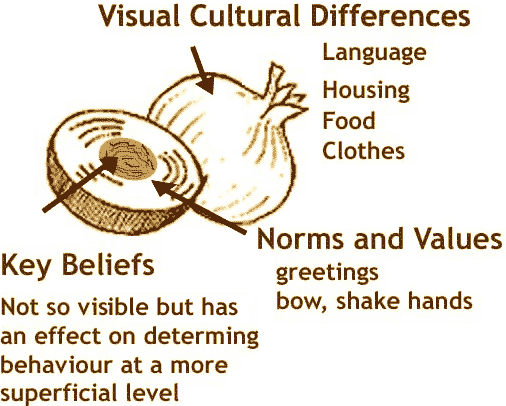
CULTURE AS AN
ICEBERG
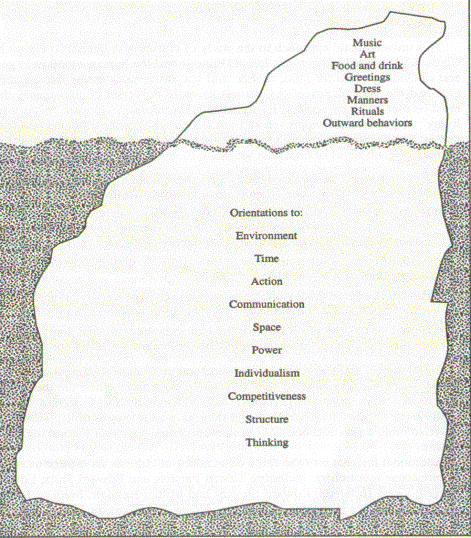
The foundation for most
cross-cultural interpretation is the work of Geert Hofstede. He developed with
the help of large-scale samples starting in the 1970s cultural index scores for
five constructs:
Power distance,
Uncertainty avoidance,
Individualism/Collectivism,
Masculinity/Feminity and
Long term/Short term
orientation.
These dimension are
acquired through “mental programming”, learned patterns of thinking, feeling and
potential acting.
Three level of uniqueness
are distinguished:
The inherited universal
human nature,
the learned culture
specific to certain societies or groups within a society, and
the inherited and learned
individual personality.
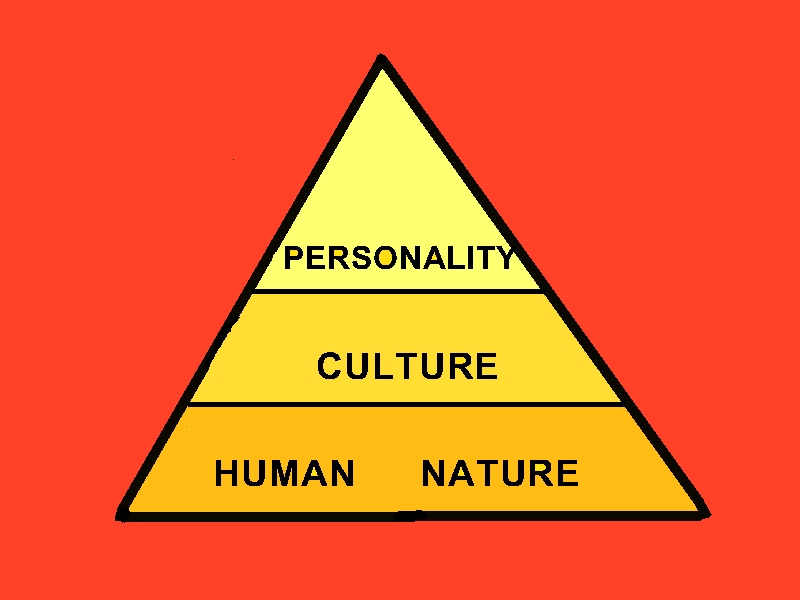
Hofstede’s five cultural
dimensions with scores for China, Japan, USA and Switzerland (lowest possible
score 1, highest possible score 100)
|
Dimensions |
China |
Japan |
USA |
Germany |
|
(1) Power Distance.
The extent to which the less powerful members of a society accept and
expect
that power is distributed unequally. |
80 |
54 |
40 |
35 |
|
(2) Uncertainty
Avoidance. The extent to which a culture programs its members to feel either
uncomfortable or comfortable in unstructured situations and
tries to control the uncontrollable. |
30 |
92 |
46 |
65 |
|
(3) Individualism
is the degree to which individuals are supposed to look after themselves or remain
integrated into groups (Collectivism). |
20 |
46 |
91 |
67 |
|
(4) Masculinity
refers to the distribution of emotional roles between the genders, it opposes
“tough”
masculinity to “tender” feminity. |
66 |
95 |
62 |
66 |
|
(5) Long-term
orientation refers to the extent to which a culture programs its members to
accept delayed gratification of their material, social and emotional
needs. |
100 |
80 |
29 |
31 |
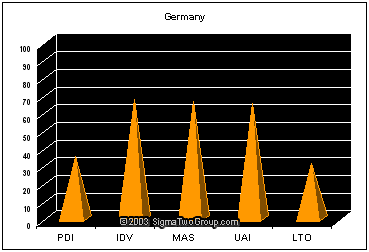 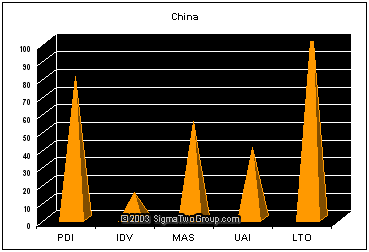 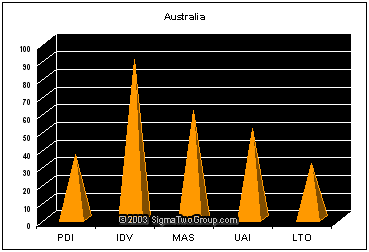 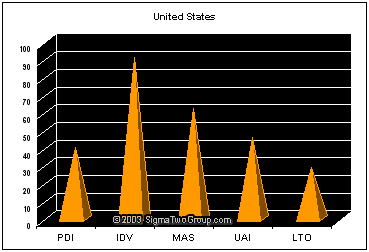
Maslow pyramid
A western idea:
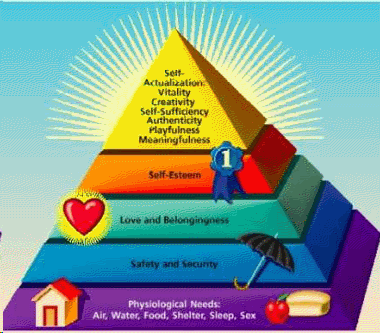
The pyramid in Asian societies:
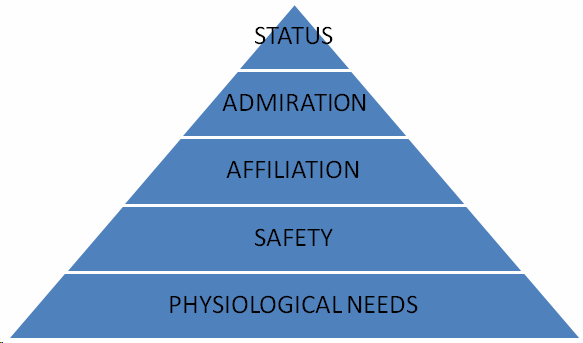
John Ap (2006)
|
